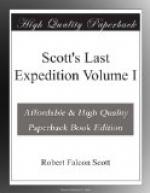Friday, December 8.—Camp 30. Hoped against hope for better conditions, to wake to the mournfullest snow and wind as usual. We had breakfast at 10, and at noon the wind dropped. We set about digging out the sledges, no light task. We then shifted our tent sites. All tents had been reduced to the smallest volume by the gradual pressure of snow. The old sites are deep pits with hollowed-in wet centres. The re-setting of the tent has at least given us comfort, especially since the wind has dropped. About 4 the sky showed signs of breaking, the sun and a few patches of land could be dimly discerned. The wind shifted in light airs and a little hope revived. Alas! as I write the sun has disappeared and snow is again falling.
Our case is growing desperate. Evans and his man-haulers tried to pull a load this afternoon. They managed to move a sledge with four people on it, pulling in ski. Pulling on foot they sank to the knees. The snow all about us is terribly deep. We tried Nobby and he plunged to his belly in it. Wilson thinks the ponies finished,_21_ but Oates thinks they will get another march in spite of the surface, if it comes to-morrow. If it should not, we must kill the ponies to-morrow and get on as best we can with the men on ski and the dogs. But one wonders what the dogs can do on such a surface. I much fear they also will prove inadequate. Oh! for fine weather, if only to the Glacier. The temperature remains 33 deg., and everything is disgustingly wet.
11 P.M.—The wind has gone to the north, the sky is really breaking at last, the sun showing less sparingly, and the land appearing out of the haze. The temperature has fallen to 26 deg., and the water nuisance is already bating. With so fair a promise of improvement it would be too cruel to have to face bad weather to-morrow. There is good cheer in the camp to-night in the prospect of action. The poor ponies look wistfully for the food of which so very little remains, yet they are not hungry, as recent savings have resulted from food left in their nosebags. They look wonderfully fit, all things considered. Everything looks more hopeful to-night, but nothing can recall four lost days.
Saturday, December 9.—Camp 31. I turned out two or three times in the night to find the weather slowly improving; at 5.30 we all got up, and at 8 got away with the ponies—a most painful day. The tremendous snowfall of the late storm had made the surface intolerably soft, and after the first hour there was no glide. We pressed on the poor half-rationed animals, but could get none to lead for more than a few minutes; following, the animals would do fairly well. It looked as we could never make headway; the man-haulers were pressed into the service to aid matters. Bowers and Cherry-Garrard went ahead with one 10-foot sledge,—thus most painfully we made about a mile. The situation was saved by P.O. Evans, who put the last pair




